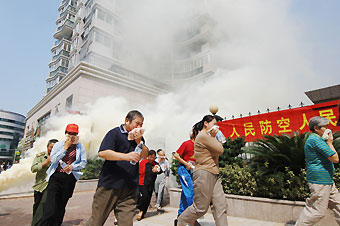Watching a historical film. Visiting museums.
Shutting down businesses for the day. These were among the many ways people
across the country yesterday marked the 75th anniversary of the 'September 18
Incident', which signalled the start of Japan's invasion of China.

Local residents
evacuate during an air defence drill in Hangzhou, Zhejiang Province on
September 18, 2006. [Xinhua]
|
University students nationwide were offered half-price tickets to Tokyo
Trial, a movie released earlier this month by Shanghai Film Group Corporation.
The film depicts the trial of 28 top Japanese war criminals at the
International Military Tribunal for the Far East in 1946 by judges of 11 Allied
Powers, including China, after Japan's surrender at the end of World War II.
Kang Xuejun, manager of Xindong'an cinema in Beijing, told China Daily
yesterday morning that the movie was almost fully booked for the afternoon
shows; and has drawn more audiences of various age groups than other
history-themed movies.
On September 18, 1931, Japanese troops blew up a section of the Dalian-Harbin
Railway near Shenyang, capital of Northeast China's Liaoning Province. Using the
pretext of sabotage by Chinese troops, they bombarded the Chinese barracks near
Shenyang the same evening, starting a massive invasion.
In Northeast China, the first region that fell to invading Japanese forces,
people turned up in large numbers at museums, which provide a truthful account
of history.
More than 1,500 people visited a newly-opened museum at what was formerly the
Museum of the Imperial Palace of the Manchu State in Changchun, capital of Jilin
Province.
The museum focuses on how invading troops annexed Northeast China; and some
of the 1,000 documents and antiques on display are donated by Japanese veterans
and peace-loving overseas friends, according to the curator, Li Yifu.
More than 20,000 people visited the September 18 Historic Fact Museum in
Shenyang, capital of Liaoning.
The museum has a collection of 2,000 antiques, photos and documents and more
than 7 million people from both home and abroad have visited it, Jin Xiaoguang,
the curator, was quoted as saying by Xinhua.
Wang Dan, a 57-year-old resident who has visited the museum annually in the
past many years, said: "Many of my relatives died in the war. Time has elapsed
but history should never be forgotten. We can learn many lessons from history."
In Changsha, capital of Central China's Hunan Province, a wedding service
company reportedly inspired by other businesses in the city shut down for the
day.
It is improper to celebrate on a day of national humiliation, the company
said in an announcement.